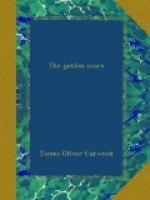He believed now that some mysterious and potent force had restrained Bram Johnson from taking advantage of the splendid opportunity of that night to rid himself of an enemy. As he made his way through the scrub timber along the edge of the Barren it was with the feeling that he no longer desired Bram as a prisoner. A thing more interesting than Bram had entered into the adventure. It was the golden snare. Not with Bram himself, but only at the end of Bram’s trail, would he find what the golden snare stood for. There he would discover the mystery and the tragedy of it, if it meant anything at all. He appreciated the extreme hazard of following Bram to his long hidden retreat. The man he might outwit in pursuit and overcome in fair fight, if it came to a fight, but against the pack he was fighting tremendous odds.
What this odds meant had not fully gripped him until he came cautiously out of the timber half an hour later and saw what was left of the caribou the pack had killed. The bull had fallen within fifty yards of the edge of the scrub. For a radius of twenty feet about it the snow was beaten hard by the footprints of beasts, and this arena was stained red with blood and scattered thickly with bits of flesh, broken bones and patches of hide. Philip could see where Bram had come in on the run, and where he had kicked off his snowshoes. After that his great moccasin tracks mingled with those of the wolves. Bram had evidently come in time to save the hind quarters, which had been dragged to a spot well out of the red ring of slaughter. After that the stars must have looked down upon an amazing scene. The hungry horde had left scarcely more than the disemboweled offal. Where Bram had dragged his meat there was a small circle worn by moccasin tracks, and here, too, were small bits of flesh, scattered about—the discarded remnants of Bram’s own feast.
The snow told as clearly as a printed page what had happened after that. Its story amazed Philip. From somewhere Bram had produced a sledge, and on this sledge he had loaded what remained of the caribou meat. From the marks in the snow Philip saw that it had been of the low ootapanask type, but that it was longer and broader than any sledge he had ever seen. He did not have to guess at what had happened. Everything was too clear for that. Far back on the Barren Bram had loosed his pack at sight of the caribou, and the pursuit and kill had followed. After that, when beasts and man had gorged themselves, they had returned through the night for the sledge. Bram had made a wide detour so that he would not again pass near the finger of scrub timber that concealed his enemy, and with a curious quickening of the blood in his veins Philip observed how closely the pack hung at his heels. The man was master—absolutely. Later they had returned with the sledge, Bram had loaded his meat, and with his pack had struck out straight north over the Barren. Every wolf was in harness, and Bram rode on the sledge.




